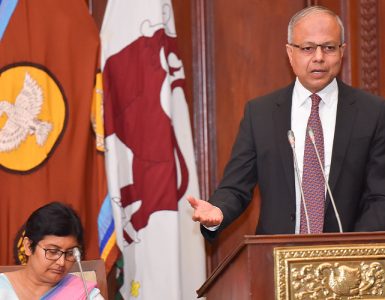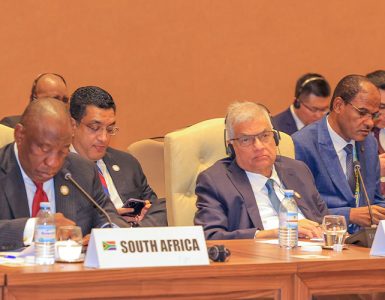The Third Session of Sri Lanka’s Fifth Youth Parliament took place over two consecutive days, on June 17th and 18th, within the main auditorium of the Presidential Secretariat. Key figures, including Mr K. Maheshan, Secretary of the Ministry of Sports and Youth Affairs, Mr Dhanushka Ramanayake, Director General of the President Media Division, and Mr Pasindu Gunaratne, Chairman and Director General of the National Youth Service Council, were present at the opening session.
The inaugural gathering saw the participation of 131 members who represented the entire Sri Lankan Youth Parliament. Prime Minister of the Youth Parliament, Mr Pathum Ranasinghe, delivered a warm welcome address at the commencement of the Third Session of the Fifth Youth Parliament.
The third session of the Sri Lankan Youth Parliament’s fifth term commenced with the entrance of the Sergeant at Arms, carrying the ceremonial mace, accompanied by the Speaker of the Youth Parliament.
Over the course of the two-day session, which occurred on Saturday, the 17th, and Sunday, the 18th, intensive debates were held on the proposed Youth Parliament Act.
During the opening ceremony of the third session of the Fifth Youth Parliament of Sri Lanka, Mr Dhanushka Ramanayake, the Director General of the President’s Media Division, delivered an address.
“In 1960, the world at large began to witness the effects of youth frustration, and our country was no exception. Recognizing the need to address this unrest, Mr. J. R. Jayawardena, then a cabinet minister, proposed a bill to the Government of Sri Lanka in 1967. The aim was to find a solution to uplift the youth and propel them forward.
Brigadier Arya Levi, an Israeli expert, conducted an extensive study in Sri Lanka during the same year, resulting in a comprehensive report. The primary objective of this research was to explore ways to harness the knowledge and labour of Sri Lankan youth for national development. It laid a crucial foundation for overcoming youth discontent and transforming their potential into a mechanism for implementing national policies.
In accordance with these efforts, Mr. J. R. Jayawardena, then a cabinet minister presented the Parliament Act No. 11 of 1967 to the Cabinet and subsequently tabled it in Parliament. This Act, known as the Voluntary Youth Service Act, incorporated the recommendations of the Levy Committee to direct youthful energy towards national development. As a result, the bill is now being debated in this chamber.
In 1977, when Mr. J. R. Jayawardena assumed the presidency, he appointed the youngest cabinet minister of that time, Mr. Ranil Wickremesinghe, who currently serves as the President. Mr. Wickremesinghe, in his capacity as the Minister of Youth Affairs and Employment, introduced a program with a focus on the youth in Colombo and aimed to integrate the youth of rural areas into a broader framework. This program emphasized the development of physical resources, particularly youth human resource divisions, in every district and province. With the aspiration of fostering young leaders who can play a central role in the future development of society and the country, a new proposal was presented to Parliament, aiming to establish a system for producing leaders in rural areas by connecting them with the existing framework.
In 1979, Mr. Ranil Wickremesinghe, who held the position of Cabinet Minister responsible for Youth Affairs at the time, took initiatives to enact the National Youth Service Act.
The inception of activities by the Maharagama Youth Service Council in 1978 can be attributed to the program implemented by President Ranil Wickremesinghe, who was then the Minister of Youth Affairs and Employment in Mr. J. R. Jayawardena’s Government. Continuing his efforts, he not only activated this act but also established the Maharagama National Youth Service Council with assistance from the Japanese Government. Since then, the concept of Yovun Pura, which began in 1985, has undergone gradual changes. Minister Dallas Alahaperuma later proposed a structural transformation, turning it into a platform where the Speaker of the National Youth Service Council, the Prime Minister, government representatives, opposition parties, and various other stakeholders can discuss proposals.
Public broadcasting plays a crucial role in any government policy. We urge the Parliament to engage in debate and devise a policy strategy that effectively communicates these broadcasts, benefiting the country, its youth, and the global community. You, as representatives of the youth, account for 4.64 million individuals, roughly 23.2% of Sri Lanka’s population and approximately a quarter of its youth.
Setting aside personal political opinions and desires, if you can champion the ambitions of the 4.64 million youth you represent in Parliament, the benefits will manifest in the coming decades. The current President, Mr. Ranil Wickremesinghe, is dedicated to making Sri Lanka a complete nation for the present and future youth, aiming for the year 2048. His focus includes formulating comprehensive plans to reform the country’s education system, aligning it with future needs to enhance the human resource potential of the youth.
Youth representation within the Parliament’s Sectoral Oversight Committees is crucial for the success of this program. This youth parliament aims to cultivate professional politicians who can contribute to the country’s progress. It is imperative to start preparing for this responsibility immediately. Your assistance is needed to actively participate in the formal drafting of the Youth Parliament Act currently under consideration.
Mr. Pasindu Gunaratne, the Chairman and Director General of the National Youth Service Council, had the vision from the beginning to transform the National Youth Parliament into an independent institution, freed from the constraints imposed by successive regimes and the agendas of various individuals. The history of this country has failed to provide the necessary foundation for youth to determine their own aspirations. This context underpins our proceedings today.
When considering the role of youth in shaping government policies and laws, the biggest mistake we have made is not allowing them to draft their own bills. Hence, it is my firm belief that the proposed Youth Parliament Act should incorporate the suggestions of our MPs. We must not repeat the historical error of having non-youth individuals decide and implement what the youth want and need. I strongly urge you to contribute to the development of our nation.
Today, you will become part of a historic process, transforming the National Youth Parliament into a formidable institution capable of operating autonomously within a defined legislative framework in the upcoming Parliament. This youth parliament should be the primary source for nurturing talented leaders for the country’s national legislature.”
Mr. Pathum Ranasinghe, the Prime Minister of Sri Lanka’s Fifth Youth Parliament;
“We must consider how far the parliamentary democracy we have practiced for the past 113 years is consistent with Sri Lanka’s advancement. From my observation, we have not received the necessary guidance and impetus for advancement through this system. Therefore, our current obligation is to devise a system that truly suits us. We must establish a governance tradition that aligns with our values, traditions, and the collective mind-set. The youth of today hold a significant responsibility in this regard, without a doubt. The National Youth Parliament possesses the potential and capacity to undertake a wider array of tasks in fulfilling this role.
It is imperative to sustain the process of enacting the National Youth Parliament Act, allowing the National Youth Parliament to make a more substantial contribution to the development of national policies.”
During this occasion, the Speaker of the Fifth Sri Lankan Youth Parliament, Nipuni Sheheni Abedheera, along with the Opposition Leader Sitija Mihiranga and several other MPs, graced the event with their presence.





